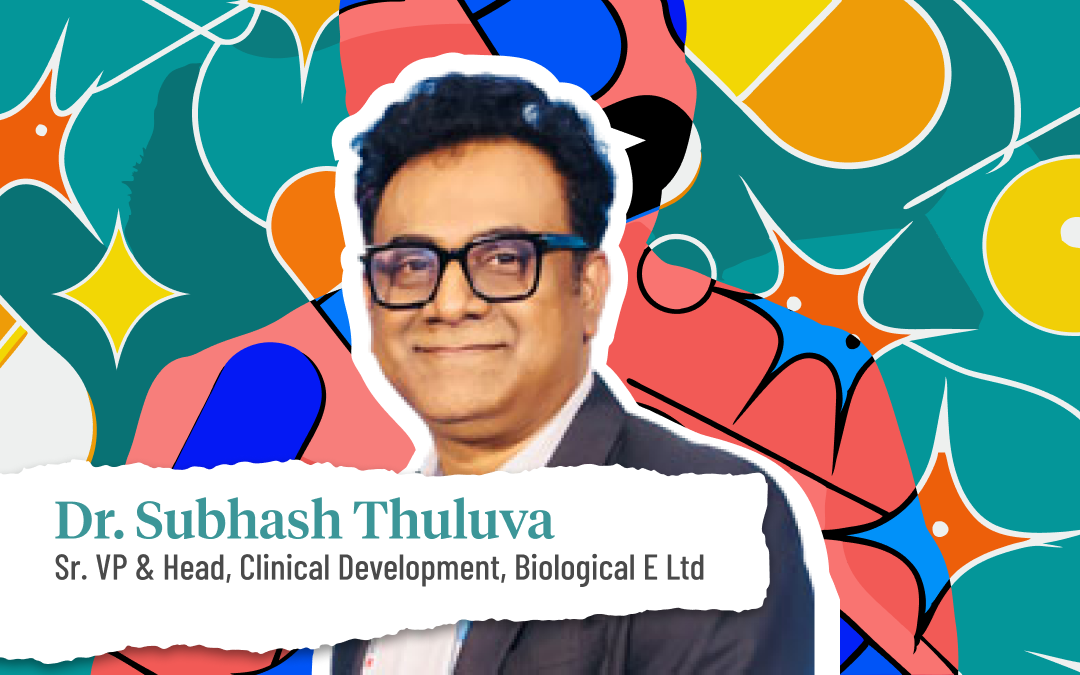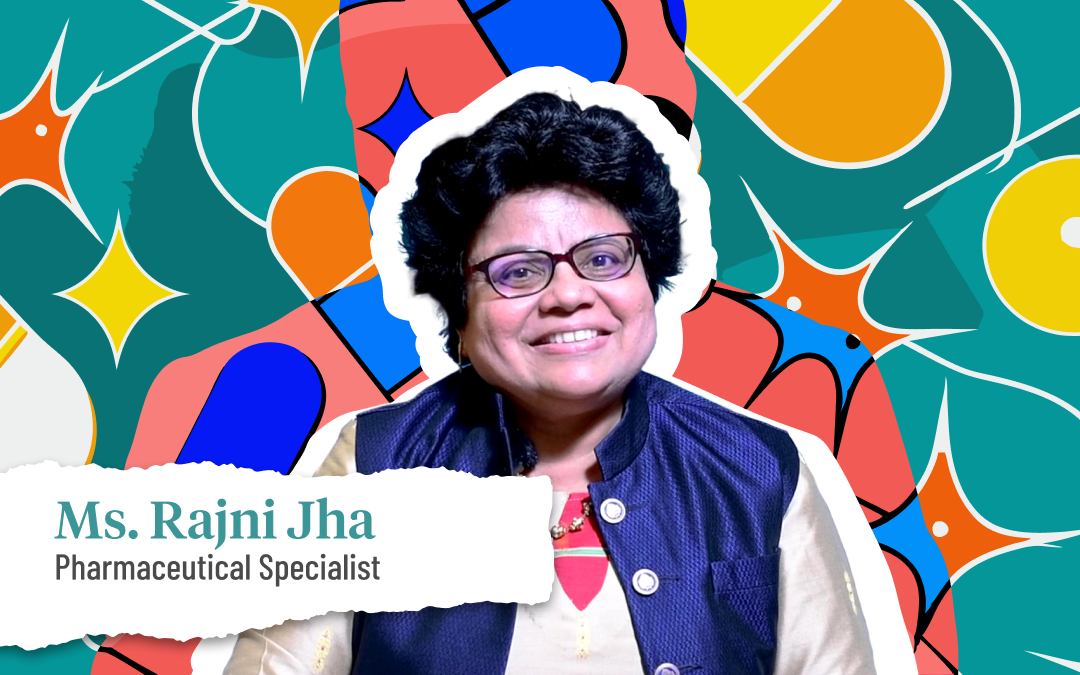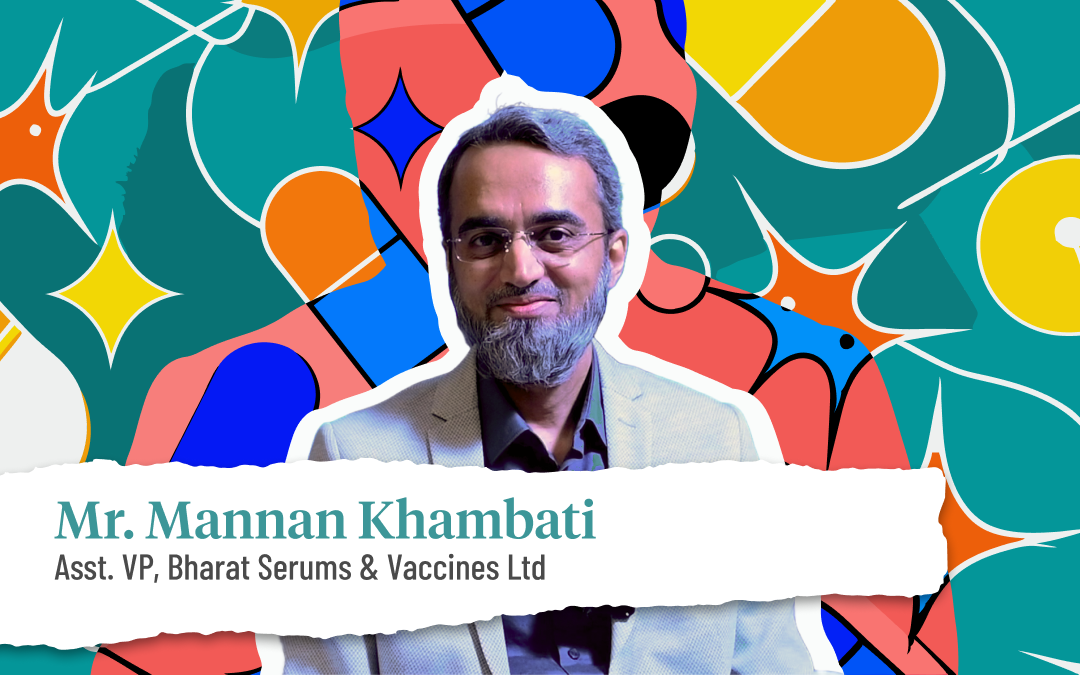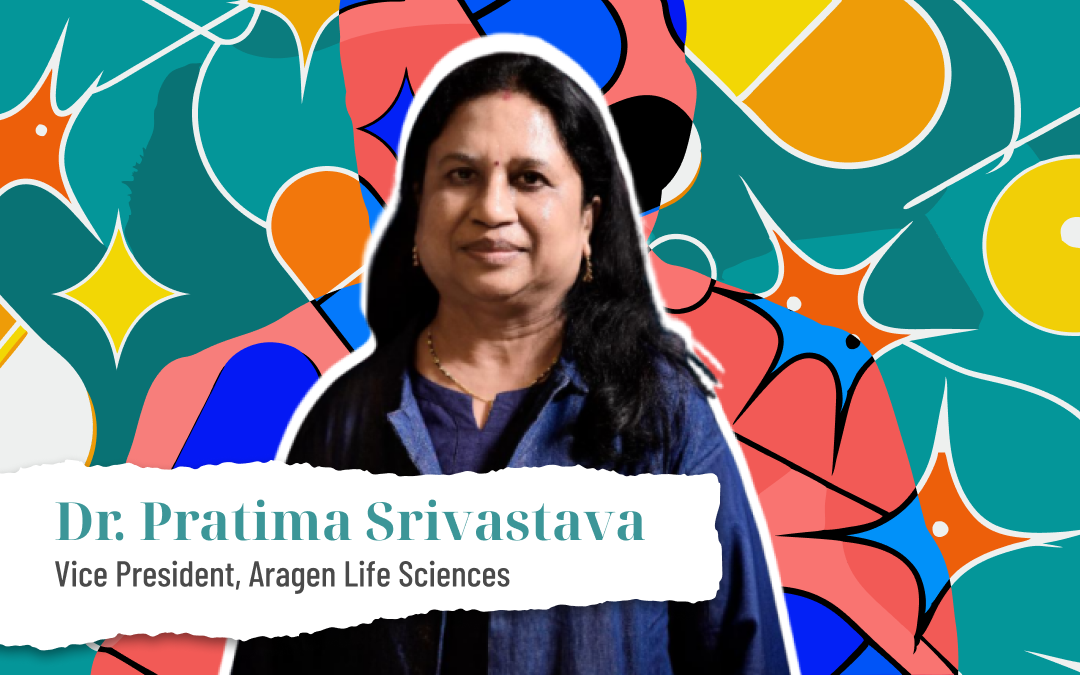QnA
Interview | May 27, 2025
Dr. Tathagata Dutta serves as the President of Jodas Expoim Pvt. Ltd., where he drives the company’s strategic vision, global business development, and operational excellence across pharmaceutical exports. With a Ph.D. and strong grounding in life sciences, he bridges scientific insight and commercial acumen to expand market reach, build client trust, and uphold quality standards. Known for his leadership across supply chain, regulatory compliance, and international trade, Dr. Dutta leads with integrity and a commitment to elevating India’s pharmaceutical exports on the global stage—fostering partnerships that balance innovation, reliability, and sustainable growth.
Dr. Tathagata Dutta is a pharmaceutical scientist and innovator with over 20 years of expertise in R&D drug delivery, nanotechnology, and complex injectable formulation development. Currently serving as Chief Scientific Officer at Refex Life Sciences, he has held prominent leadership roles across global pharmaceutical and research organizations, driving innovation in ophthalmics, parenterals, liposomes, microspheres, siRNA, and long-acting injectables. His specialization includes 505(b)(2) product development, lyophilized powder for injection, and advanced drug delivery systems, with a proven track record in formulation design, process development, and clinical development strategies.
Dr. Dutta’s global career includes impactful tenures at the Diamantina Institute of Cancer in Australia and Ranbaxy Labs, where he led initiatives in formulation science and scale-up of both novel and generic products. Dr. Dutta earned his Ph.D. in Pharmaceutical Sciences from Dr. Harisingh Gour University, where he focused on dendrimer-mediated delivery of antiretroviral bioactives. He also holds a Master’s in Pharmaceutics from the same institution. To complement his scientific acumen with business and strategic expertise, he completed the Senior Management Program in General Management at the Indian Institute of Management, Calcutta. Combining deep scientific insight with cross-functional leadership, Dr. Dutta continues to pioneer advancements in pharmaceutical R&D and drug delivery systems.
Pharma Now: Welcome to Pharma Now, Dr. Dutta. What motivated you to choose pharmaceutical sciences?
Dr Dutta: I come from a very humble and patriotic family from Bengal. My maternal and paternal grandparents were freedom fighters. I was raised by my maternal grandparents because my mother was a teacher, and my father was an agricultural officer. They embedded a deep sense of patriotism in me.
In the sixth grade, I fell in love with science and never looked back. As a child, I frequently fell ill and had to skip school. In these times, books were my only friend. I used to read books and listen to stories. I was deeply inspired by Professor Shonku, a character created by Satyajit Ray, the world-famous film director, author and painter. In the books, Professor Shonku invented unimaginable things, like a pill called Miracurall that can single-handedly cure any disease and a weapon called Annihillin that could completely annihilate a person. He inspired me to become a scientist and an innovator. There is a difference between a scientist and an innovator: A scientist does science, but an innovator turns this science into an implementable product.
Dr. Binay Kumar Sarkar, a doctor who treated my illnesses and later became a good friend, also guided me. After the 12th grade, I wanted to study physics and pursue research in astrophysics. He suggested that I should pursue pharmacy because it was also a part of science. I was skeptical, but he motivated me. Finally, I was admitted into a pharmacy college, and that’s how my journey started. I fell in love with pharmacy, and there was no looking back.
Pharma Now: How did you secure your first position in the industry?
Dr Dutta: I completed B. Pharm from the Bharti College of Pharmacy, University of Mysore, Karnataka. I was a university topper. I also secured an All-India First Rank in the Graduate Aptitude Test for Engineering (GATE). Then, I was admitted into Dr. Harisingh Gour University, Sagar, Madhya Pradesh, one of India’s top pharmacy institutes. There, I learned from prominent people like Prof. Narendra Kumar Jain, Prof. S. P. Vyas, and Prof. V. K. Dixit.
During my Master’s, because my name was at the top of the merit list, they let me choose my specialization. I chose pharmaceutical biotechnology, but my professors advised me to opt for pharmaceutics. I disagreed because I wanted to do research. Prof. Jain, who later on became my guide and mentor, convinced me that research can be done in any field. He recommended that I choose pharmaceutics because the field is completely oriented to the industry. So, I chose pharmaceutics as my specialization.
For my third-semester project, I insisted on working in that field, though our college lacked the infrastructure. In 2002, I began reviewing literature and found that the Centre for Cellular and Molecular Biology (CCMB) was working on gene therapy. Before approaching them, I first went to the Central Drug Research Institute (CDRI) in Lucknow, but couldn’t get much help from them. Later on, with the introduction letter, I went to CCMB in Hyderabad, where I met Dr Lalji Singh. He is the Father of Indian DNA Fingerprinting, and he founded the Society of Human Genetics. He allowed me to perform my projects at the CCMB for 6 months.
One thing I'd like to emphasize on, for students and freshers, I wanted to join the industry, but I had no contacts because there was no internet. I used to send applications to the HR heads of different companies through a speed post, but I never got replies. Still, I wanted to join the industry and pursue gene therapy. In 2003, I was invited to speak at the Annual Conference of the Indian Society of Human Genetics in Jammu. It was an international conference where they asked me to talk about my project. There, even though I was a student, I got VIP treatment. On the final day, I presented my research, and many people appreciated me. During lunch, a lady complemented me, “Dr. Dutta, your presentation was wonderful.” I politely corrected her and said, “Ma'am, I’m not a doctor yet, I’m still pursuing my Master’s”. She inquired about my job status, and upon learning that I was still searching for one, offered me a job at Ranbaxy (now a part of Sun Pharma). She was one of the Vice Presidents at Ranbaxy.
A few days later, I found an interview invitation from Ranbaxy, but I had missed the date. I noted a landline number on the mail, called them and requested that they reschedule. To my relief, they did. It went very well. I was offered a position in R&D (formulation & development) at Ranbaxy. That marked the beginning of my journey in the pharmaceutical industry.
Pharma Now: Can you share a quick insight into your career and the many inspiring roles you’ve occupied?
Dr Dutta: After 2 years, I got a senior research fellowship from the Indian Council for Medical Research (ICMR). I left my job and went on to pursue my PhD. We worked on DNA vaccination. DNA vaccination is discussed today, but our group studied it in 2005, all thanks to the Government of India and ICMR who sponsored the project and publications. Based on this work, I got good Postdoctoral offers from the University of Queensland and Diamantina Institute of Cancer Immunology and Metabolic Medicine, where they wanted me to work on siRNA therapeutics, which is gene silencing. I decided to pursue that and went there. I worked on gene silencing and noble drug delivery systems.
After postdoctoral work, I worked for many. multinational companies as a scientist, group leader, associate director, director and many more. One day, I was travelling from Los Angeles to Michigan. The person sitting next to me engaged me in a conversation. He asked, “Have you ever thought about the difference between you and your boss? He is a leader, and you are a scientist. You take pride in being a scientist, but eventually, one has to be a leader. Do you want to remain a manager or a leader?” I had never thought about it. While leaving, he handed me his card and told me to stay in touch and left. Later, I showed the card to my friends, and they were surprised that I had met the world’s biggest management guru, C. K. Prahalad.
I called him, and obviously, he didn't pick up the call as he is a very busy person. But later that night, he called me back. I was surprised and asked him, “Why did you call me back?”. He answered, “Tathagata, I get hundreds of calls every day. I can’t attend all of them, but whenever I get time, I reciprocate each of them.” When asked why, he said, “A hundred calls might be junk, but one may be an opportunity knocking at my door.” That was a life-changing lesson. During this interview, my mobile may be on silent and I may miss many calls, but once I’m done, I'll call everyone back one by one.
After talking to him, I took admission in IIM Calcutta and completed MBA in executive management. I studied with C. K. Prahalad’s students at IIM Calcutta. One of his books, Fortune at the Bottom of the Pyramid, mentioned that people believe fortune is only at the top, but that’s not so. This book changed my view of the whole world, and it helped me change consciously.
Pharma Now: Your journey to becoming a leader started when you met C. K. Prahalad. What is the fundamental difference between a manager and a leader?
Dr Dutta: To me, a manager is someone who manages people and gets tasks done through them. He works with people. A leader leads people. He sets an example. A leader doesn’t tell people what to do—he motivates them to do it. They don’t feel like they’ve been asked to do things; they do things willingly.
Here’s an excellent example: About 15 years ago, I attended a party where Mr. Ratan Tata was present. I noticed that Mr. Tata quietly picked up a tissue and bent down to pick up a piece of bone that had fallen on the floor. He threw it in the bin. He didn’t ask anyone to clean it. That silent gesture conveyed a powerful message. A manager would have called housekeeping, but a leader shows the way through action.
Here’s another example: I was with Mr. D.S. Brar, the former chairperson of Ranbaxy, in the office canteen one day. It started raining and everyone ran to avoid getting wet. Mr. Brar continued walking at the same pace, completely unbothered. Watching him, others stopped running and followed calmly. That’s leadership: discipline, calm, and inspiration.
Today, I encourage flexible working hours, but I reach the office between 7 and 8 AM. Office hours begin at 9, and I use these extra hours to catch up on emails and other work. So, when people arrive, I’m available for meetings.
Pharma Now: Today, there’s a lot of discussion about work-life balance, 8-hour workdays, and 4-day work weeks. How do you define work-life balance?
Dr. Dutta: I believe work-life balance is essential. I don’t agree with working 90 hours or constantly pushing beyond limits. Yes, I’ve had extreme moments, like working for three days non-stop during FDA audits, but that’s rare. During those times, even if I didn’t have anything specific to do, I stayed back with my team to show support. That’s what motivates people. They don’t feel like they’re alone. One of my team members, a QA head and a mother of two, once told me she’d stay back during a critical moment, even though I asked her to leave early for her children. That commitment was voluntary. I never force anyone to work excessive hours.
Planning is the key. I use software to schedule my week and check off tasks as I complete them. I also take short walks between meetings—walking promotes blood circulation and gives me time to informally connect with team members.
After 5:30 PM, it’s my time. I don’t schedule meetings or calls—even with international clients. I insist they schedule earlier. A five-day workweek is great. Four-day work weeks–I haven’t tried them, so I can’t comment. But, I believe, passion is more important than counting days. If I’m passionate about a project, I might work weekends too, by choice, not obligation. It should be the same for everyone.
Pharma Now: Now that you’ve transitioned to a leadership position, do you still have time for laboratory work?
Dr. Dutta: Yes, absolutely! That’s my oxygen. Without it, I can’t function. I am a scientist before a Chief Scientific Officer or a Managing Director or a Chief Technology Officer. There are three titles that define me: I’m a pharmacist, I’m a scientist, and I’m a teacher.
Pharma Now: I heard in one of your interviews that you keep carnivorous plants at home. Can you elaborate on this unique hobby?
Dr. Dutta: Yes! Plants are very close to my heart. My father was an agriculture officer and maintained a large garden. Inspired by that, I started collecting carnivorous plants for their sustainability. They naturally trap and digest insects, keeping my house free of pests. They require little water and minimal care. These plants are ornamental and functional. I source them from authentic suppliers from Northeast India and abroad.
Pharma Now: You’re a voracious reader. Who are your favourite authors and poets?
Dr. Dutta: My favourite poet is Robert Frost, whose poem The Road Not Taken resonates with me deeply. I think that I’ve taken the road less travelled, which made all the difference in my career. After my Ranbaxy days, I worked with small pharma companies rather than established giants, and that gave me holistic exposure.
Innovation doesn’t usually happen in big companies. Smaller companies have agility. Innovation starts in the mind. You don’t need large investments. For example, Dr. K. V. Prasad Reddy started Shanta Biotech to make hepatitis B vaccines affordable. He wasn’t a pharmacist, but he had a dream and pursued it relentlessly. We need dreamers. Whether you're a scientist, artist, or entrepreneur, dreams and passion drive everything. If you cannot dream, you will never become a scientist. If you cannot dream, you will never become an entrepreneur.
Pharma Now: We’ve seen many new advancements in recent years. What is the future like for advanced technologies like gene therapy and personalized medicine in India?
Dr. Dutta: The future is bright. Government support is at an all-time high. Institutions are being turned into Centers of Excellence. IIT faculties are encouraged to create startups. We are standing at a very critical juncture of history.
My professor, Mr. N. K. Jain, used to say that human beings always look for shortcuts. We must stop chasing low-hanging fruits like generics, complex generics, and biosimilars. If we want to become a $5 trillion economy, we must invest in biologics and real innovation. If we want our GDP to grow, innovation is needed. It will give us global recognition, growth, and resilience—especially during trade wars. If your product is unique, tariffs won’t matter. Insurers will still pay if doctors prescribe it.
Pharma Now: Yes, that’s true. Thank you for joining us at Pharma Now, Dr. Dutta. It was our pleasure to host you.

FT - Dr. Subhash Thuluva

FT - Ms. Rajni Jha

FT - Mr. Mannan Khambati

FT - Dr. Pratima Srivastava

FT - Dr. Subhash Thuluva
Dr. Subhash Thuluva, Senior VP at Biological E, shares his 25-year journey in clinical development, ...

FT - Ms. Rajni Jha
Ms. Rajni Jha, a seasoned pharmaceutical specialist, shares her journey from the lab to becoming a l...

FT - Mr. Mannan Khambati
Mr. Mannan Khambati, AVP of Biotech Manufacturing at Bharat Serums and Vaccines, shares his inspirin...

FT - Dr. Pratima Srivastava
Dr. Pratima Srivastava, Vice President at Aragen, shares her remarkable journey from aspiring scient...